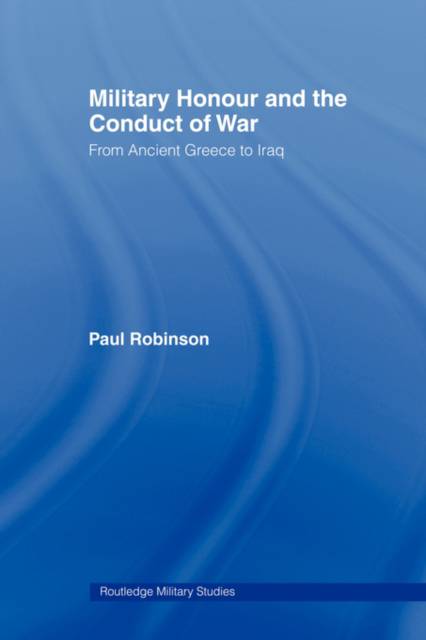
- Retrait gratuit dans votre magasin Club
- 7.000.000 titres dans notre catalogue
- Payer en toute sécurité
- Toujours un magasin près de chez vous
- Retrait gratuit dans votre magasin Club
- 7.000.0000 titres dans notre catalogue
- Payer en toute sécurité
- Toujours un magasin près de chez vous
Description
This study presents the first examination of the influence of ideas of honour on the causes, conduct and ending of wars from Ancient Greece to the present day.
Paul Robinson begins with a theoretical examination of the concept of honour, to clearly explain the many contradictions and tensions inherent within honour systems. He then shows how honour has often contradictory and paradoxical effects on the conduct of war and illustrates this through seven case studies: Classical Greece; Ancient Rome; mediaeval Chivalry; Elizabethan England; the American Civil War; the British Empire; and the Western world after World War II (including the Vietnam War and the current conflict in Iraq).
Key topics covered include:
- honour and virtue
- honour and the causes of war
- honour as a motivation for fighting
- honours and rewards
- death and honour
- honour and the conduct of war
- honour and the enemy
- honour and the ending of wars
- women and honour
This book reveals that the often contradictory behaviour of soldiers during war is a product of the contradictions inherent in the concept of honour.
This book will be of great interest to all students of military ethics, military history, politics, international relations, anthropology, sociology, philosophy and the history of ideas.Spécifications
Parties prenantes
- Auteur(s) :
- Editeur:
Contenu
- Nombre de pages :
- 224
- Langue:
- Anglais
- Collection :
Caractéristiques
- EAN:
- 9780415545099
- Date de parution :
- 30-01-09
- Format:
- Livre broché
- Format numérique:
- Trade paperback (VS)
- Dimensions :
- 156 mm x 234 mm
- Poids :
- 326 g

Les avis
Nous publions uniquement les avis qui respectent les conditions requises. Consultez nos conditions pour les avis.






